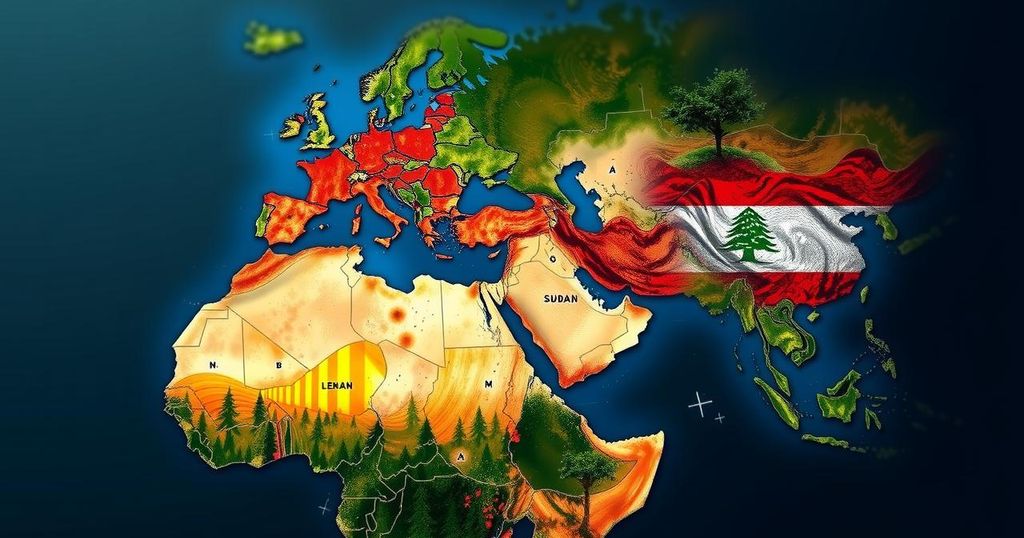Recent reports have highlighted urgent humanitarian crises across various regions involving significant violence and strain on humanitarian efforts. Key issues include increasing gender-based violence in Haiti and Lebanon, flooding in Gaza, escalating conflict in Syria and Ukraine, and critical food supply challenges in Sudan. These situations have notably affected women and children, requiring immediate international attention and substantial aid funding to alleviate the dire conditions found in these regions.
This week, humanitarian crises and conflicts in multiple regions, including Sudan, the Occupied Palestinian Territory, Lebanon, Haiti, Ukraine, and Syria, have dominated the news. In Sudan, Under-Secretary-General Tom Fletcher highlighted the urgency of addressing the crisis as he visited areas affected by conflict and violence against women and girls. The World Food Programme commenced its first humanitarian air service flight to Dongola to facilitate aid distribution. Meanwhile, the situation in the Occupied Palestinian Territory worsened as heavy rainfall exacerbated flooding issues for displaced families, with over 1.6 million individuals living in makeshift shelters. In Lebanon, hostilities have resulted in unprecedented casualties, leaving more than a million people affected and hundreds dead in recent attacks. In Haiti, gender-based violence has surged disproportionately against women and girls amid a severe funding shortage for vital support services. The ongoing conflict in Ukraine has continued to result in civilian casualties and damage to infrastructure, with humanitarian organizations mobilizing rapidly to provide assistance. In Syria, attacks led to civilian deaths while health facilities struggle with funding shortages. Through these narratives, the systemic issues affecting vulnerable populations globally are evident, underscoring the need for immediate intervention and support.
Overall, humanitarian efforts across these regions reflect a dire need for consistent and immediate attention to alleviate the suffering of millions while addressing violence, displacement, and resource shortages affecting women and children disproportionately.
In conclusion, it is evident that the humanitarian crises in these affected regions are in urgent need of international attention and response. The situations echo a call for global solidarity, increased funding for aid, and the necessity to prioritize the protection and well-being of the most vulnerable populations.
Ultimately, these updates remind us of the growing complexities of global humanitarian challenges and the imperative for a united front in addressing these foundational issues that undermine peace and stability. Individually, each case reflects broader systemic problems in humanitarian governance and the need for sustainable solutions.
The ongoing humanitarian crises around the world are complex, driven by armed conflicts, natural disasters, and systemic issues such as gender-based violence. Regions such as Sudan, the Occupied Palestinian Territory, Lebanon, Haiti, Ukraine, and Syria illustrate varying challenges where large populations face displacement, violence, and substantial health risks due to funding shortages. In many instances, vulnerable groups, particularly women and children, disproportionately bear the brunt of these crises, necessitating a focused response from the international community. It is important to understand these dynamics to appreciate the gravity of the situation in affected areas and the critical need for humanitarian assistance and intervention.
The humanitarian situations reported in Sudan, the Occupied Palestinian Territory, Lebanon, Haiti, Ukraine, and Syria illustrate a confluence of crises demanding urgent action. There is a pressing need for enhanced international support and funding for aid efforts, especially in addressing the needs of women and children. This by far represents a key moment for global solidarity in humanitarian response, urging prompt corrective measures to mitigate suffering and enable recovery in these distressed regions.
Original Source: www.unocha.org






